I’ve been struggling with what to title this particular post. Since I am in the Thai town of Pai (sounds like pie) I thought maybe the title should be: “Hi, Hi Hi, I’m In Pai.” Nah! Too cutesy. I had just about decided on “Pie-Eyed In Pai” because of the eye-popping beauty of the area but then thought better of that title as well, worried someone might think I’d gone on a drinking binge. Maybe something to do with the Pied Piper – a takeoff on the fact that so many expats have flocked to this area? Again, it wasn’t quite right. I finally gave up (been doing a lot of that lately) and just started writing, figuring that the title would reveal itself along the way.
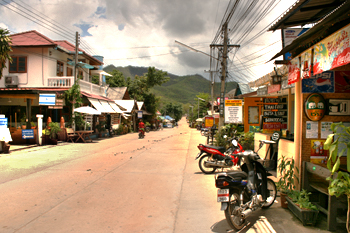
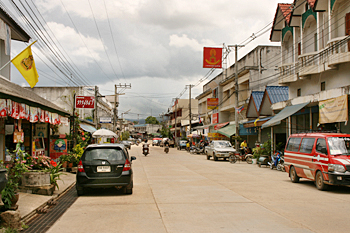
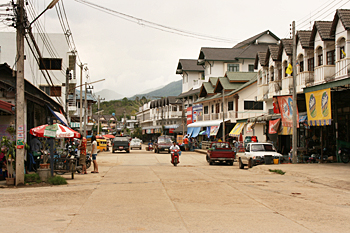
Yesterday I tore myself away from the resort long enough to walk around the village. It didn’t take long – it’s not a big town. I walked the two blocks to the main street and turned right toward the highway, drinking in the views of the scenic mountains that ring the town. Along the way I passed the post office, the police station and the market. At the market, men and women in traditional hill tribe dress went about their everyday business – shopping for food, trading goods, etc. These are the real hill tribe members – not some trumped up show put on for the benefit of tourists.
I stopped into several of the smaller stores in search of a rain poncho and finally found one in a store run by Muslim women who were dressed in traditional burqas that covered their entire body from head to toe, with the exception of a small region around the eyes. Everywhere I ran into modern day ‘hippies’ – Brits, Aussies, and even the occasional American who have tuned out and dropped into Pai for good. Pai is a multi-ethnic town and seemingly everyone lives in peace.
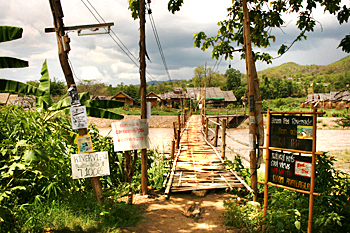
At the highway I turned left and headed toward the Pai River, which forms a natural boundary between the town and the countryside. At intervals along the banks locals have built rickety bamboo footbridges over the muddy waters to avoid going all the way to the town’s one concrete bridge. I gingerly crept out onto the wobbly bamboo, testing first with each step to make sure it would hold my weight. My courage failed about 12 feet out into the river and I retreated. I assume these bridges are not solidly built because they are swept away each rainy season and built again when the waters recede. I continued along the river to the northernmost point of the town, where I again picked up the street leading back to the resort.
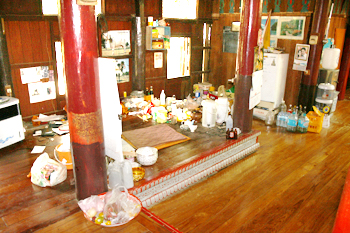
Along this road I found two of the three Wats in Pai. As has become my custom, I stopped into each of them to pay my respects. The differences between the Wats here and the Wats in Chiang Mai or Bangkok are startling. The Chedis out back of the Vihara (meeting hall) are small and unimposing. Inside the Vihara, the decor is simple, the carpets are worn and it is obvious that the monks live here, since their sleeping mats are laid out in plain view, surrounded by their few personal possessions and a mini refrigerator supplied by the Wat. Despite the simplicity, or perhaps because of it, I felt that these Wats were so much more spiritual than their opulent cousins in the south.
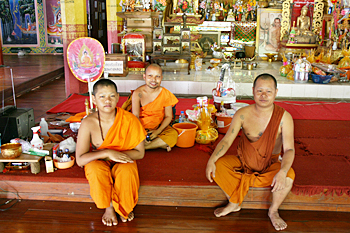
At Wat Pa Kam, three monks sat on the platform near the statue of Buddha. I hesitated at the open doorway, not knowing if I would be welcome. The monks immediately motioned for me to enter. I Wai’ed to them (bowed from the waist with the palms of my hands held together in front of my heart), removed my shoes, and stepped inside. I knelt down on the platform, sitting on my heels, and prayed my gratitude, as I do now on a daily basis. When I was done, I prostrated myself three times and rose to leave, but the monks were not done with me. After asking, “Where you from?” their English capabilities seemed to be exhausted so we resorted to sign language. The head monk pointed to the string tied around my left wrist with a smile. Yes, I nodded, adding, “Doi Suthep,” which told them where I had received this traditional monk blessing. Excitedly, he grabbed a large roll of string and motioned for me to sit on the platform, where he proceeded to pray over me as he wound three more strands around my wrist and tied it off in a knot. The youngest monk, struggling with the English words, said, “Mon wish you gud luk. Mon wish you gud healt. Mon wish you lon life.” I was delighted – especially with the good health part. Again I Wai’ed to each of them, saying Khop Khun Ka (thank you). I spotted the donation box and dropped a 20 baht note into it, and with one last Khop Khun Ka I began to leave.
For some reason, the fact that I had made a donation excited them even more and they again motioned for me to come up to the platform. They handed me two small white candles and a Bic lighter, signing that I should light the candles and place them in the holder in front of the Buddha statue. Then they placed a handful of incense sticks in my fist, guiding them down to the candle flame to be lit and indicating I should deposit them in the brass bowl aside the candle holder, where the smoke would carry our collective prayers up to heaven. Again I rose, Wai’ed and Khop Khun Ka’ed, then I turned slowly to leave. Before I reached the front entry the smallest monk poked me in the arm. When I turned, he was holding a glistening apple out to me with both of his hands. Overcome with emotion, I bowed and accepted his gift, knowing that to refuse would be an insult. But it was such a humbling experience. These monks live in poverty. They sleep on thin wicker mats on the hard floor and have no possessions of their own. They eat one meal a day, before noon, which consists of whatever is put into their alms bowls by the locals. They have only the clothes on their backs and perhaps one extra robe – not like the monks I saw in Chiang Mai who were smoking cigarettes while talking on their cell phones. And here they were, giving me a gift. I don’t even LIKE apples, but you can bet I ate that one, savoring every bite, with tears streaming down my cheeks as I made my way back to the resort. It was a precious gift and one that I will remember for the rest of my life.
I later told this story to Toy, the General Manager at the resort, who has been fussing over me like a mother hen. She was astounded. I knew this was a special gift but I didn’t have any idea how special. She explained that most of the time people give food to the monks, not the other way around, but on the rare occasion that a monk gives a gift of food it is almost always to a local person – not to a foreigner – and that this food is considered to be very powerful because the monks have prayed over it as it sat before the altar.
I don’t know why these things happen to me; they just do. I am grateful beyond belief for the opportunity I have had to experience and learn about so many cultures. I am a lucky person. I have been well and truly blessed. And that, my friends, just has to be the title I was searching for – I Have Been Well And Truly Blessed!.

Lovely story! I loved Pai – a super hippie town. As for titles – I loved the shirts there that read UtoPAI
.-= Sherry Ott´s last blog ..Photo(s) of the Week – Sep. 19, 2009 =-.
That was such an incredible thing that the monks did. You were meant to go to Pai and receive this blessing. Good for you to listen to your heart and follow it. Take care and be well. Karen
Just talked to a friend from Wanchese of all places who was in Pai last October. She said she found the best ice cream in the world there from a street vendor and also went white water rafting. Enjoy…til later. Ellie
YOU ARE TRULY BLESSED, I HAVE ALWAYS KNOWN THAT. IT SOUNDS LIKE YOU ARE HAVING A WONDERFUL TIME. HAVE A VERY SAFE TRIP. I LOVE YOU.
CAROL
Hey Barb,
I sent you the million blessings before I read the blog so yes, you are truly blessed.
Namaste
Joan